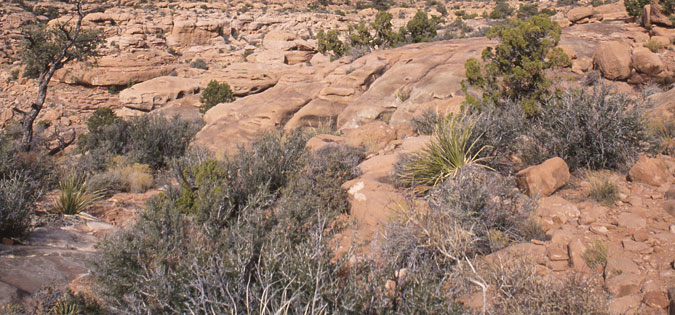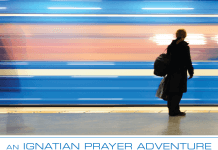 This post is based on Week Three of An Ignatian Prayer Adventure.
This post is based on Week Three of An Ignatian Prayer Adventure.
When I was introduced to Ignatian spirituality through the “Retreat in Daily Life” (the 19th Annotation), the hardest part for me was the spotlight on sin in the First Week. Why is it so hard to seek the grace of “a healthy sense of shame and confusion before God,” or to “consider the effects of sin in my life, my community, and my world”?
Most of us who go to Mass and receive Communion every Sunday aren’t conscious of mortal sin—the kind of transgression that we have been taught merits damnation unless we expunge it in sacramental confession. Unlike King David, we haven’t committed rape and adultery followed by murder (2 Samuel 11:2–4, 15–17); we are not thieves, embezzlers, or pornographers. But checking off a list of felonies not committed doesn’t mean I am free of sin.
What, then, are my sins? I have found the Ignatian Examen an effective way to answer that question and to understand my own sinfulness and its effects. Asking myself every day which of my actions, or failures to act, have drawn me closer to God and which have drawn me away, is much more fruitful than the review I do when asking for the grace to make a good confession.
Within this framework, some of the questions that I ask myself help me to see patterns: Have I spent money on something I don’t really need? Have I just spent too much on restaurant meals or taxis? Have I rationalized some of these actions with spurious reasoning?
Other questions about what I’ve done in the last 24 hours lead me to broader questions that are harder to answer. Have I wasted food? And recently: Have I wasted water?
Water comes up in my prayer quite a lot lately. I can’t escape the thought that the sufferings of the people in Cape Town, South Africa, represent the proverbial “canary in the coal mine” and that a shortage of pure water may become a much more widespread problem in our lifetimes. This in turn has made me acutely conscious of not letting the water—our pure, free, seemingly unlimited New York City water—run unnecessarily. But what does this mean? I haven’t quenched the thirst of anyone in Cape Town—or have I?
Whenever I try to grasp the effects of sin on a broad scale—what is often called “social sin” or sometimes “structural sin”—my first reaction is discouragement. What can I do to counter the cruelty of tyrannical governments, the greed of global companies, or the hard-heartedness of those in positions of power who would do nothing to help the victims of drought? The answer, for me, is to remember that we are all part of the Body of Christ, and that somehow, in ways we can’t imagine, all our acts and omissions affect all the other members.
I’m still working that one out. God isn’t finished with me yet.



Thanks to all of you for your reflections! I am a member of an LTMTP group in our parish (Lord Teach Me To Pray). My wife died in 2014, I joined the group, and it has been a life-saving experience– just as your comments are😂! Nathan Simmons
Another very thought-provoking Reflection. Thank you. AS I am old, i cannot undo my past, of course. The sins of omission are very often on my mind. A friend of mine believes that we are too old to be committing SIN, I say one is never too old; especially while one can still think and SPEAK. Words can do lots of damage, sometimes unthinkingly. AS regards the waste of water, I just received my quarterly water account, so I must watch that also.Thanks for the reminder. A.M.D.G.
I loved this reflection, mainly because I live in Cape Town! Thank you for thinking of us. We don’t consider how what we waste may affect us later on and when you live in a country where the general population only know how to live for today and mostly have no idea how to plan for tomorrow, the problems are compounded!
However, we are now experts in coping on 50 liters per day, it has also made me much more aware of waste and of finding ways to reduce it. It is a healthy exercise to consider sin on such a large scale even if our own efforts seem insignificant .
Dear Deirdre
Thank you so much for your comment, which moved me deeply. Your courage and determination are inspiring!
How true what you wrote– another thought would be: what does God really want from me and whether I am fulfilling what He wants me to do as His disciple — as part of the family and even amongst my friends .
Thank you for your fresh thoughts —
Very well put, Barbara! Will be using this commentary on the examen with my students. Thank you!
Dear Barbara Lee, please advise when you figure this all out. And thanks for another thoughtful reflection. Keep ’em coming.
I am intrigued by your reflection. I try hard not to be wasteful of our natural resources but it is difficult. I am encouraged to keep trying.
Other areas are maybe wastefulness of my employer’s resources like taking a longer lunch or break time than I am allotted or not mindful of spending company money on what is wanted v.s. needed.
Little things….. these are where we are called to be good stewards.
This is a very helpful way of looking at sin. I am preparing for my first (ever!) confession before being received into the Church at Easter this year. At age 60 this is a daunting prospect and I have consulted innumerable resources on examination of conscience etc. This helps me see that besides some ‘big sins’ of years ago I still have such need of mercy and forgiveness for what I have thought, said, done, or failed to do, today. Thank you!
Dear Robin
Thank you so much for your comment. How wonderful that you are preparing for Baptism at Easter! I will keep you in my prayers.